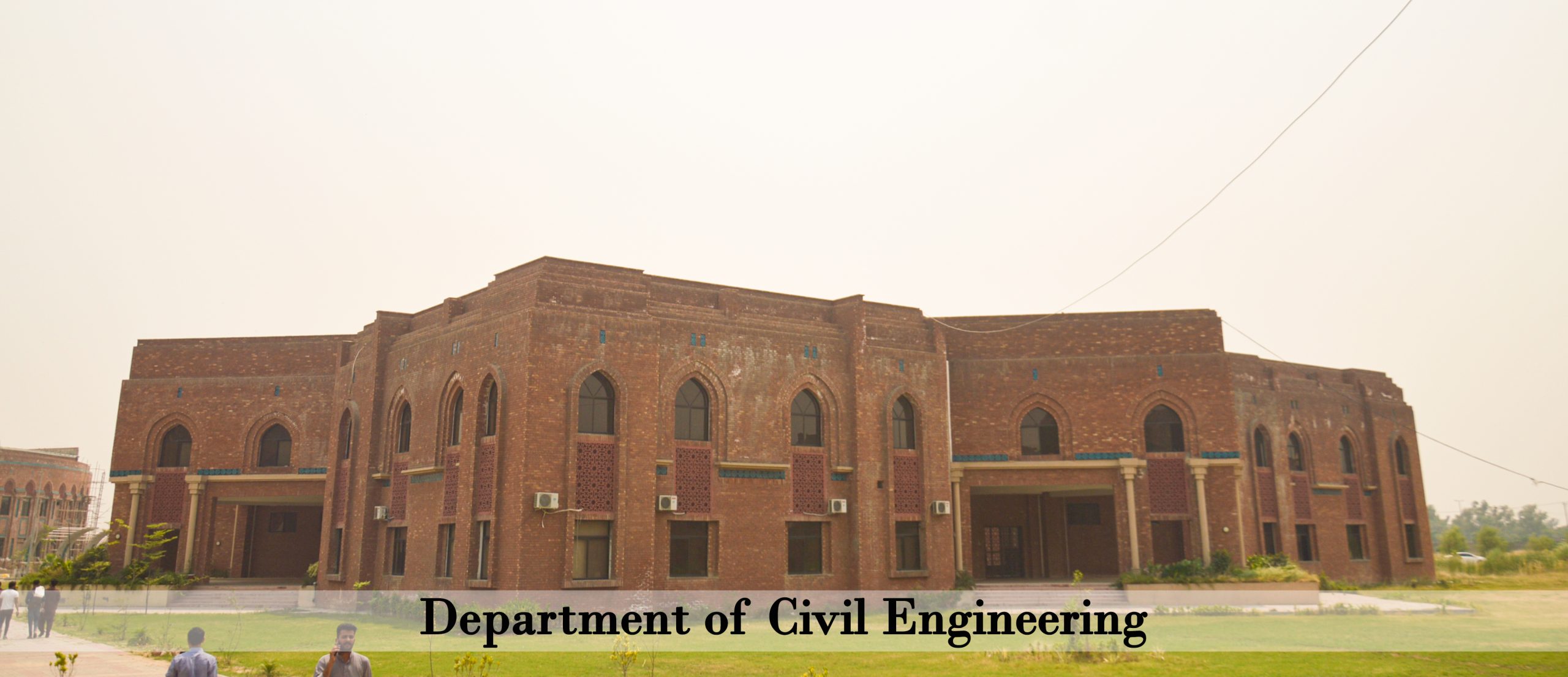The Department of Civil Engineering is a constituent department of the University of Engineering & Technology Lahore, Narowal Campus. It was established in 2013. It has been providing quality education to the students in improvising their competencies for novel techniques and methods to fulfill the needs of sustainable socio-economic development. This diverse platform is established for providing excellence in engineering education and facilitating its students to acquire the advanced knowledge. The department, at present, has enrolled around 140 students in undergraduate program. The department has highly qualified and experienced faculty as well as trained and skilled lab staff. The Civil Engineering Program at UET Narowal campus is accredited with Pakistan Engineering Council (PEC).
Civil Engineering Program Mission
To impart high quality civil engineering education through modern teaching and research for the national and international socio-economic development
Civil Engineering Program Educational Outcomes(PEO’s)
PEO-1
Graduates demonstrate their proficiency of applying the knowledge & skills to solve complex civil engineering problems
PEO-2
Graduates communicate effectively and contribute to the project team
PEO-3
Graduates uphold principles of ethics and societal obligations with integrity throughout their professional practices
PEO-4
Graduates engage themselves in continuous professional learning process for sustainability
Civil Engineering Program Learning Outcomes(PLO’s)
PLO1 Engineering Knowledge: An ability to apply knowledge of mathematics, science, engineering fundamentals and an engineering specialization to the solution of complex engineering problems
PLO2 Problem Analysis: An ability to identify, formulate, research literature, and analyze complex engineering problems reaching substantiated conclusions using first principles of mathematics, natural sciences and engineering sciences
PLO3 Design/Development of Solutions: An ability to design solutions for complex engineering problems and design systems, components or processes that meet specified needs with appropriate consideration for public health and safety, cultural, societal, and environmental considerations
PLO4 Investigation: An ability to investigate complex engineering problems in a methodical way including literature survey, design and conduct of experiments, analysis and interpretation of experimental data, and synthesis of information to derive valid conclusions
PLO5 Modern Tool Usage: An ability to create, select and apply appropriate techniques, resources, and modern engineering and IT tools, including prediction and modeling, to complex engineering activities, with an understanding of the limitations
PLO6 The Engineer and Society: An ability to apply reasoning informed by contextual knowledge to assess societal, health, safety, legal and cultural issues and the consequent responsibilities relevant to professional engineering practice and solution to complex engineering problems
PLO7 Environment and Sustainability: An ability to understand the impact of professional engineering solutions in societal and environmental contexts and demonstrate knowledge of and need for sustainable development
PLO8 Ethics: Apply ethical principles and commit to professional ethics and responsibilities and norms of engineering practice
PLO9 Individual and Team Work: An ability to work effectively, as an individual or in a team, on multifaceted and /or multidisciplinary settings
PLO10 Communication: An ability to communicate effectively, orally as well as in writing, on complex engineering activities with the engineering community and with society at large, such as being able to comprehend and write effective reports and design documentation, make effective presentations, and give and receive clear instructions
PLO11 Project Management: An ability to demonstrate management skills and apply engineering principles to one’s own work, as a member and/or leader in a team, to manage projects in a multidisciplinary environment
PLO12 Lifelong Learning: An ability to recognize importance of, and pursue lifelong learning in the broader context of innovation and technological developments

